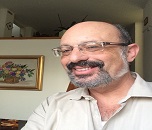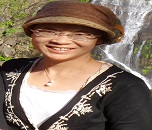Day 1 :
Keynote Forum
Jacob Gopas
Soroka University Medical Center, Israel
Keynote: Cellular Senescence in Hodgkin’s Lymphoma
Time : 09:30-10:15

Biography:
Abstract:
Hodgkin’s Lymphoma (HL) is a B cell originated malignancy of the immune system. Although the rate of cure is high, about 20-35% of patients relapse and about half of them eventually die of the disease or treatment-related late toxicities and secondary malignancies. Conceptually novel treatment strategies are thus needed, particularly for this category of patients. The malignant cells, called Hodgkin and Reed-Sternberg (HRS) cells, only make up 1-2% of the total tumor cellularity, the remaining mass comprising a mixed infiltrate population is thought to be recruited to the lymph node by HRS-driven pro-inflammatory signals. We propose that a sub-population of HRS cells, which we call herein large RS cells, have characteristics of senescent cells, and, thus produce large amounts of inflammatory mediators (the so-called Senescence-Associated Secretory Phenotype or SASP). Senescence is characterized by permanent cell cycle arrest and loss of proliferative capacity, despite continued viability and metabolic activity. We show that the senescence markers the cell cycle inhibitors p16INK4a and p21Cip1 are expressed in large RS cells in all HL biopsies examined. Moreover, the large RS cells are negative for Ki-67 staining, demonstrating that these cells have ceased to proliferate. We also show that large, ‘RS-like’ cells in a HL-derived line, L428, stained for the characteristic senescence marker β-galactosidase (β-gal). Oxidative stress and chemotherapy increased the proportion of β-gal positive large RS cells. Furthermore, we show that the large RS cells secrete high levels of cytokines. We suggest that these senescent RS cells may be responsible, at least in part, for creating a pro-inflammatory microenvironment, promoting HL pathogenesis, and mediating chemoresistance in relapsed disease. Understanding the pathways important for the establishment of senescence in HRS cells, as well gaining insight into targetable mechanisms for the eradication of these cells, will provide new therapeutic approaches for HL patients with recurrent or chemo-resistant disease.
Keynote Forum
Celestial T. Yap
National University of Singapore, Singapore
Keynote: Multiple roles of the cytoskeletal protein, gelsolin, in gastrointestinal tumour cells that contribute to dissemination and tumour progression

Biography:
Celestial T Yap has obtained MBBS degree from the National University of Singapore. She is engaged in clinical practice and subsequently obtained a PhD in Biomedical Sciences at the University of Edinburgh, UK. She is the Physiology Program Director and the Integration Lead Educator at the Yong Loo Lin School of Medicine, NUS, overseeing undergraduate education in clinical sciences. She leads the cytoskeleton and tumor biology laboratory, which focuses on cytoskeletal derangements and signaling pathways that promote tumor invasion and resistance, as well as biomarkers for cancer detection.
Abstract:
Gelsolin is an actin-binding protein which regulates the dynamics of the actin cytoskeleton and is involved in several pathological conditions including cancer. The roles of gelsolin in cancer are complex, there is evidence that it contributes to both tumor suppression as well as malignant progression. Studies suggest that gelsolin can act as a tumor suppressor, with decreased expression of gelsolin observed in cancers such as breast and lung cancers. On the other hand, high gelsolin expression has been correlated with aggressive tumors, such as with high grade urothelial and oral carcinomas, and lymphatic invasion in lung cancer. We identified gelsolin expression to be up-regulated in tumor tissues which exhibit disseminative behavior, such in lymph node metastases of intestinal-type gastric cancer, in primary tumors of diffuse gastric cancer and at the invasive edges of colon cancer metastases in the liver. We found that gelsolin can promote dissemination of gastrointestinal cancer cells by several mechanisms-gelsolin dysregulates the cellular redox milieu and promotes extracellular matrix degradation, leading to increased invasive activity of cancer cells. Gelsolin also interacts with the Hepatocyte Growth Factor (HGF)-cMET pathway and affects intercellular adhesion to promote cell scattering. In addition, gelsolin protects cancer cells from stress by activating autophagy. The multiple roles of gelsolin that contribute to cancer progression will be discussed.
